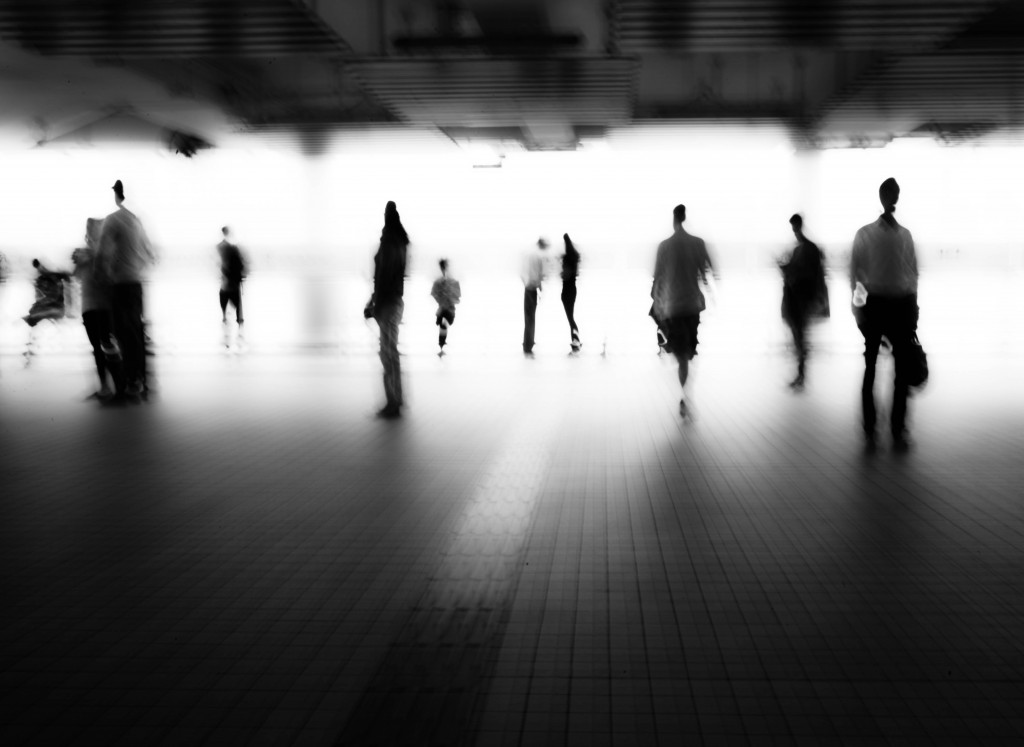The Equilibrium World is the world that is made up of our judgments, conclusions and inferences. It is the world that’s made up of our thoughts in other words, because every thought is a judgement, every thought is a conclusion. The key point to understand about this world is that it is one in which no change can ever happen. It’s a sealed-off world, a frozen world, a closed world, a world that is always subject in every respect to the very same set of rules. We could also say that the Equilibrium World is a world that is totally regulated – nothing happens except that which is supposed to happen, nothing happens except in the way that it is meant to happen. This is a world which we are all too familiar with, therefore – no one needs to tell us about it, no one needs to tell us what it’s like to live this type of regulated life.
The Equilibrium World is actually the only world we know, but it is also a trick. It’s a trick because there’s no such world. What we relating to isn’t a world really, it’s just our own evaluations and conclusions reflected back at us, as if they weren’t our evaluations and conclusions. An evaluation is never the same as ‘what’s really there’, after all – an evaluation is just a conclusion that we have hastily jumped to for strictly pragmatic reasons. We can’t generally speaking afford to sit around all day pondering the ultimate meaning of things; such a propensity would have very little survival value to us – we need to identify a threat as a threat or potential advantage as a potential advantage and act accordingly. I don’t need to know what the ultimate meaning of a rattlesnake is, just as long as I know that I mustn’t let it bite me!
What is pragmatically useful can also be very dangerous in another way however – in a subtler kind of a way, a way that we very much tend to be oblivious about. The danger here is more psychological than biological, and it isn’t something that we can immediately recognise. When we’re in this ‘pragmatic survival mode’ then we automatically convert the world into concrete threats and concrete disadvantages. They are ‘concrete’ because they represent final values, values that have no other level of meaning behind them. Once we have converted the world into concrete statements of fact in this way then clearly there is no way back for us. This now becomes our world, even though it isn’t a world but only our own evaluations reflected back at us. There’s a part of us which is rather slow to grasp this point – we are very much biased towards seeing our evaluations as being both a fixture of the world around us and a final reality, which actually of course they’re not. They’re not final and – even more to the point – they don’t exist in the first place, either to be final or not final. There really oughtn’t to be any confusion on this point, clearly enough, but there absolutely is. There is no end of confusion. There is ultimate confusion…
So when we say, as we have said, that we convert the world into concrete statements of fact as a result of our being in pragmatic survival mode we might just as well said that we are converting the world into a construct that is made up of evaluations that we ourselves have made but do not know that we have made. We’re looking at two totally different propositions here – one is the world ‘as it is in itself’, the other is ‘the meaning we project on that world’, which has nothing to do with ‘the world as it is in itself’. To confuse these two scenarios is to be very confused therefore, not to put too fine a point on it – we’re confusing something that is unreal with something that is real and confusion doesn’t come any more confusing than this! We are mixing up the world as it is in itself with the world as it subjectively appears to our wholly arbitrary viewpoint. The big question is therefore ‘What type of life is it that we get to lead when we live not in the world as it is in itself but in the world that is made up of wall-to-wall self-centric conclusions that we have jumped to and cannot now escape?’ To put this another way, ‘What sort of life do we gain for ourselves when we swap wide-open reality for a private game in which we only ever take any interest in our environment when it happens to correspond to our theories, thoughts and concepts?’
In one way there’s no problem in seeing that there is such a thing as a ‘wide-open reality’, a world that isn’t an artifact of a particular arbitrarily assumed viewpoint, the difficulty is in envisaging what that world would be like – we can’t envisage it because all our envisaging is necessarily done on the basis of the artificial or conditioned viewpoint. There is no way to ‘envisage reality’, in other words. Anything we picture is always going to be a projection of the assumptions that we have made in order to be able to create the picture (or model). Anything we picture is always going to be our own projection. Just because we can’t picture it, or make an image with our thoughts of it, doesn’t present any problems as regards actually living in the world ‘as it is in itself’ (as opposed to living in the world which is our own projection) – how could it do? Reality doesn’t need to have our ideas or theories about it in order to exist, after all. Not having a theory or map or description of the world presents no obstacle to living in it. Living in our own private version of the world – the version that matches our ideas about it – does, however. That actually presents all sorts of problems – it’s just that we can’t see them, at least not at first.
Although we have said that living in the world as it is in itself presents no problems, we need to qualify this statement somewhat since there is one sense in which it does create problems – it creates insurmountable problems for the idea that we have about ourselves and this is why we are obliged to ‘shun the Immensity’, so to speak. Instead of having anything to do with the immensity of ‘wide-open reality’ we have to restrict ourselves to the modified (or edited) world which is conditioned by our own thoughts and expectations, which is a world that we can rely on to be never be any bigger than ourselves. The great thing about having a belief, we might say, is that we can neatly avoid the risk of having to live in a world that is bigger than that belief. The great thing about living in a world that is made up of our own thoughts is that we never have to live in a world that is more expansive than these thoughts. We don’t have to face that particular existential challenge! There may be more to life than is dreamt of in our philosophies, as Shakespeare says, but that doesn’t mean we have to know about it! That doesn’t mean that we have to in any way acknowledge it…
We avoid the existential risk of having to live in a world that is bigger than we are by closing our horizons in the way that we have just described, but in doing so we create another problem – we avoid existential risk by living in a world that is no bigger than our unconscious expectations, a world that is the same size as our net of interpretations, but the problem with this is that we become unreal. The world that is no bigger than me is me – I’m stuck in my own stale projection without realising it and this isn’t a real situation. I’m stuck playing a game without realizing that I am and this isn’t ever going to get me anywhere (needless to say). This is the thing however – what ‘getting somewhere’ actually means is ‘moving in the direction of seeing that who I think I am isn’t who I am’ and this just happens to be the direction we don’t ever want to travel in! That’s not part of the plan. That would constitute ‘the movement out of equilibrium’ and the movement out of equilibrium is the very last thing we want to know about. The ‘movement out of equilibrium’ is the movement into reality, after all…






